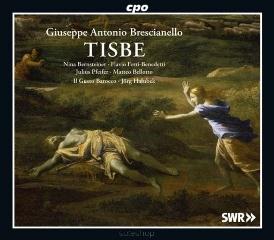Giuseppe Antonio Brescianello - Tisbe (2014)
Giuseppe Antonio Brescianello - Tisbe (2014)

Disc 1 1.Ouvertüre 2.Bella notte, al tuo solingo (1. Akt) 3.Da te, che sei d'amore 4.Chi potea contro la fede 5.Ma s'io non erro è quella 6.Pur la nostra capanna or rivedremo 7.Non sempre l'audace 8.Ormai, compagne care 9.Triforme dea 10.Mi tradiste, speranze! 11.Il vedere altrui dolente 12.Forz'è ben che l'ignota 13.L'amare è follia 14.Io vo' l'ozio tranquillo 15.Me felice! Ecco Tisbe 16.E un sereno lusinghiero 17.Dimmi, vedesti, amica 18.Van del pari e l'onda, e il fuoco 19.Fresco rio mi vien cercando (2. Akt) 20.Questo è il fonte che bagna 21.Al tenero nome in cui sospiro 22.Come al nido la rondinella 23.Sei tu, grand'ombra augusta 24.Pace, pace a due miseri amanti Disc 2 1.Anni ed anni in libertà 2.Oh maledetto arrivo 3.Cari orrori 4.Pastorella, aita... 5.Due timori al cor mi sento 6.Possano i loupi un dì mangiar costei 7.V'era augeletto e v'era 8.Che favole! Son morta 9.Villanella scortese 10.Fiero leon, sbramani omai 11.Questo appunto è quel loco 12.S'ingombri la selva 13.Questo è sangue, ahi, di chi vene? (3. Akt) 14.Sì, sì, purtroppo è vero 15.Avrò cor di riminarvi 16.Dal monte al piano e in ogni selva io corsi 17.Non è fede esser crudel 18.Alceste, o tu mi lascia 19.Son costante, e non crudel 20.Dunque a sceglier mi sforza 21.M'ha giurato amore ingrato 22.Ah, se cor tu chiudessi 23.Io ti prometto un cor 24.Belle reliquie e care, e dove siete? 25.Non turbarti, alma innocente 26.Che temi, alma codarda? 27.Ahi, pur troppo fia vero! 28.Apri i lumi moribondi 29.Odo d'intorno un lamentar pietoso 30.Di più bell'alma e pura 31.O degni, a cui sia più propizio amore! Matteo Bellotto Bass (Alceste) Flavio Ferri Benedetti Alto (Licori) Nina Bernsteiner Soprano (Tisbe) Jacopo Martello Librettist Julius Pfeiffer Tenor (Pyramus) Il Gusto Barocco Choir/Chorus Barockorchester Stuttgart Jörg Halubek Conductor, Harpsichord
An opera was prepared for performance at the court of Duke Eberhard IV Ludwig of Württemberg at the end of 1718. The duke had ordered that it be performed to conclude the Carnival season 1718 / 19 and commissioned his Italian court composer A. G. Brescianello to write a work for this occasion. The action is based on the popular tale of Pyramus and Thisbe, a source of inspiration for Shakespeare's Romeo and Juliet. During the seventeenth century opera productions were regarded as a principal means of magnificent court display. It was thus that a spectacular opera was produced, situated in the vicinity of Vivaldi, Scarlatti, and Handel and requiring virtuoso castrato artistry for its dramatic coloraturas and heartrending laments. Il Giusto Barocco has rediscovered Brescianello's opera Tisbe in the holdings of the Württemberg State Library, submitted it to musicological examination, and now once again rendered it performable. Musically, this work represents a high point in Stuttgart court culture between 1700 and 1750. Following the concert premiere in 2012, Opernwelt wrote, »Jörg Halubek and the ensemble Il Giusto Barocco founded by him demonstrate with vibrant, supple […] playing that they now have a place in the first ranks of German baroque orchestras.« ---jpc.de
The music of Giuseppe Antonio Brescianello has reached few ears in modern times. It may therefore come as a surprise to find that not only is his music of the very highest standard – fit to rub shoulders with the likes of Bach, Handel and Vivaldi – but also that his only opera is a candidate for nomination as the finest baroque opera ever written. We think that his early career was spent in Venice before he was employed by the Electress of Bavaria as a violinist at the court in Munich. He subsequently moved to the Württemberg court in Stuttgart where he dedicated his opera pastorale to his employer, Duke Eberhard Ludwig, in January 1718. The tells the story of Pyramus (tenor) and Thisbe (soprano), and the ill-fated lovers are joined by two other characters who comment on the proceedings, Licori (contralto) and Alceste (bass). In addition, there is a chorus which closes Acts 1 and 2; the orchestra is made up of strings, recorders, oboes, bassoon and horns. The tunes are of the highest quality and the limited amount of recitative ensures that the dramatic pace is strong. The opera concludes most unusually with a recitative which follows a beautiful duet for Tisbe and Pyramo. We are uncertain as to whether a final chorus or even a balletto was supposed to draw an end to the proceedings. ---laserenissima.co.uk
download (mp3 @320 kbs):
yandex mediafire ulozto bayfiles








